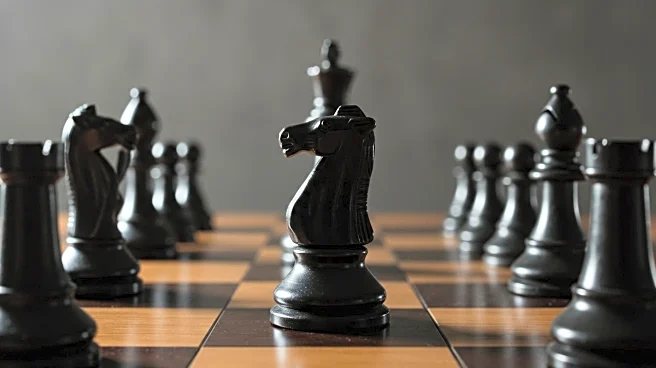What is the story about?
What's Happening?
Vincent Keymer, a 20-year-old chess prodigy from Germany, has made a significant impact at the Quantbox GM tournament in Chennai, India. Keymer achieved an unbeaten score of 7/9, defeating several top Indian grandmasters, including Arjun Erigaisi and Vidit Gujrathi. This victory has propelled Keymer into the world top 10 in the Fide live ratings for the first time, marking a major milestone in his career. The tournament took place in Chennai, a city known for its strong chess culture and home to world champion Gukesh Dommaraju. Keymer's success comes amid a challenging period for Gukesh, who has struggled in recent competitions, including the Sinquefield Cup.
Why It's Important?
Keymer's victory in Chennai is significant as it challenges the dominance of Indian chess players, who have been leading the global chess scene since their double gold win at the Budapest Olympiad in 2024. This development could signal a shift in the chess landscape, with Keymer emerging as a formidable contender for future world championships. His rise in the rankings also highlights the growing competitiveness among young grandmasters worldwide. For Germany, Keymer's success revives hopes of reclaiming a prominent position in international chess, reminiscent of the era when Robert Hübner was among the top players.
What's Next?
Keymer aims to qualify for the 2026 world candidates tournament, with aspirations to challenge Gukesh for the world title. His strategic approach and unique playing style, which emphasizes risk assessment and deviation from conventional moves, could play a crucial role in his future matches. As Keymer continues to balance his education with his chess career, his progress will be closely watched by the chess community. Meanwhile, Gukesh will need to regroup and address his recent performance issues to maintain his standing as a top player.
Beyond the Headlines
Keymer's success underscores the evolving nature of chess, where young players are increasingly adopting innovative strategies and training methods. His approach contrasts with traditional styles, focusing on classical game knowledge and strategic risk-taking. This shift may influence how future generations of players train and compete, potentially altering the dynamics of international chess competitions.















